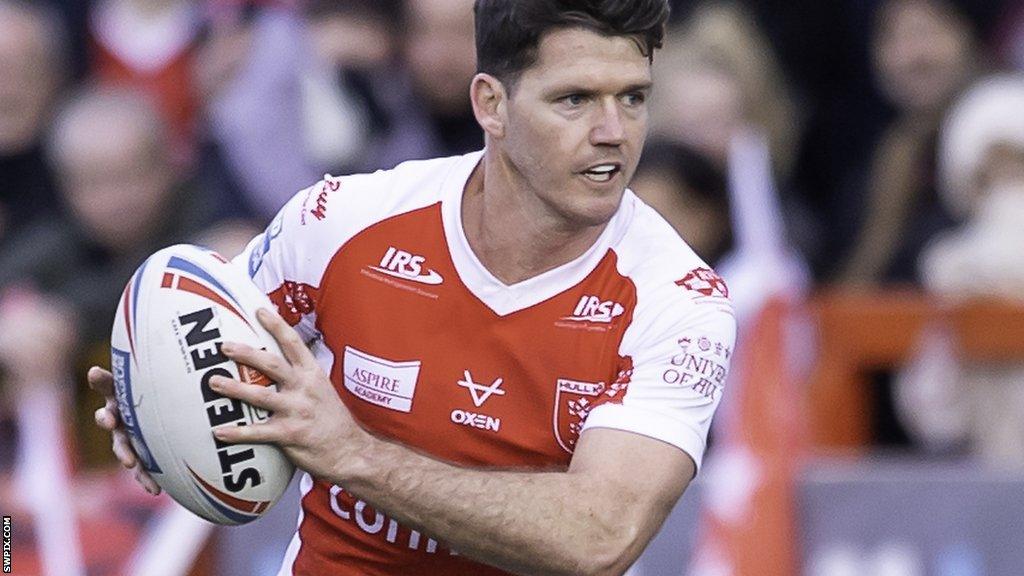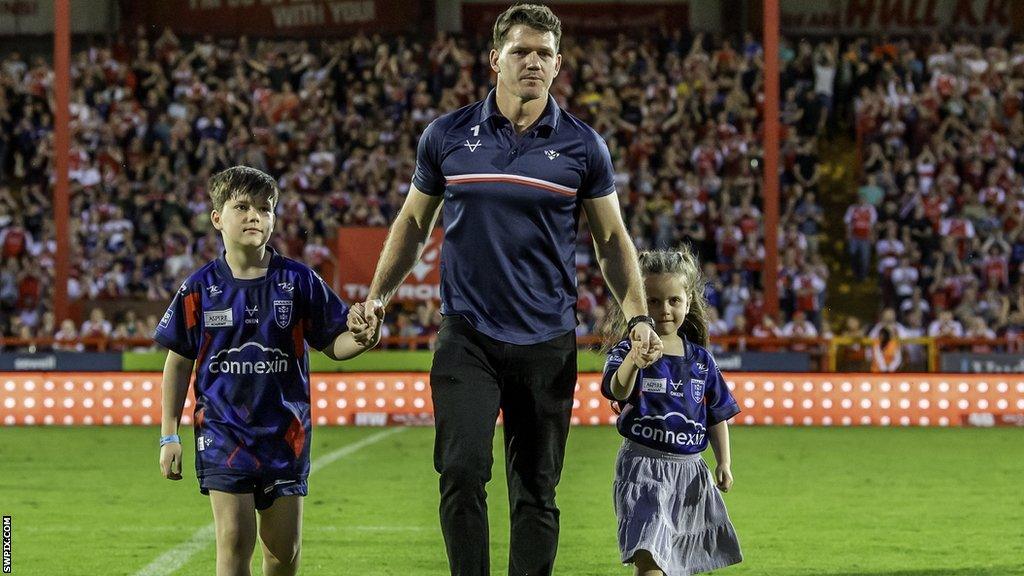Lachlan Coote: Ex-Hull KR & St Helens full-back reflects on retiring early because of concussions
- Published

Lachlan Coote said he suffered five concussions in under two years prior to retiring last month
Former St Helens and Hull KR full-back Lachlan Coote has said it was hard to accept having to retire early because of concussions.
The 33-year-old had previously decided to stop playing at the end of the season but retired last month after meeting with specialists.
"It was tough. I'm definitely still trying to come to terms with it," he told BBC Look North.
"After seeking advice and getting scans the right choice was to call it quits."
He added: "I tried to gather as much information as I could. My wife was concerned about everything and [Hull KR head coach] Willie Peters and the club had a lot of care around it, and he wanted to make sure my future was bright away from rugby league.
"There were a lot of stressful days thinking about what to do.
"I was OK mentally - it was just trying to come up with the right decision. The hardest thing was walking away from a game that has given me so much.
"I wanted to be successful at Hull KR and bring them a trophy. I've always been about finishing what you start and to not be able to do that... it was a hard decision to make."
The New South Wales-born Coote, who represented Scotland and Great Britain internationally, scored 58 tries in 166 games with Penrith and North Queensland - with whom he won the Grand Final in 2015.
St Helens signed him to replace Ben Barba in 2019 and he kicked 284 goals and scored 34 tries to help Saints win the first three of four successive Super League titles.
He also featured in Saints' 2021 Challenge Cup final win over Castleford - their first success in the cup in 13 years.
His move to Rovers for 2022 was not as successful though, as he was limited to just 27 appearances before a concussion - Coote's fifth in under two years - suffered during the Magic Weekend defeat by Salford in May proved to be his final game.
Uncertain future 'weighs on' Coote
Coote, who admitted concerns about head injuries had impacted his performances at the end of his career, said that he "doesn't know" where rugby league will be in 10 years' time as more research is done into the long-term effects of concussions.
A number of former players from both rugby codes are suing the games' governing bodies for failing to protect them against brain injuries.
The Australian said he is aware that his long-term health could be impacted by the concussions he suffered during his playing career.
"My wife wants me to be 100% in 20 years down the track and so do I, for the kids. That weighs on you, knowing that I wasn't suffering now but wondering if you would be in 20 years," he said.
"The scans showed signs of damage but they don't know what it means yet because it's new technology. It could be five years, it could be 10. Knowing that there were signs of bleeding played a massive part.
"I was worried about the future but I've come to terms with accepting what [it] is. It's a weird feeling knowing about it because in some ways it's better not to know, but it's good to find out. It is a worry to think that I could suffer in years to come but if it is then so be it.
"I chose to play the game and I've played it and loved it and enjoyed every moment. I wouldn't take that back."
'Concussions became normal'

Lachlan Coote came onto the pitch at Craven Park with his children last month after announcing his retirement from the sport
In recent years, Leeds Rhinos captain Stevie Ward and Sydney Roosters skipper Boyd Cordner have both retired from the game because of the effects of concussions.
Coote acknowledged that the sport's approach to head injuries had improved greatly across the course of his career.
"The concussions became normal and it's weird to say because when you speak to people outside of the sport they're taken aback by it, but in rugby league it's just something you learn to deal with and move on," he said.
"At the early stages of my career it was a case of getting knocked out and being back in training on Monday and playing on Saturday. It's good that it's now being treated as an injury and you're given the time to rest."
He added: "100% the sport is learning. Just because you can't see it and you can wake up the next day feeling normal it doesn't mean it doesn't have effects.
"Because it was happening to me more I started to notice the symptoms more. I would forget things, and that can happen to anyone, but I was having it more often than normal and that was very frightening.
"Within a couple of days I'd feel better but knowing it was effecting me was scary."